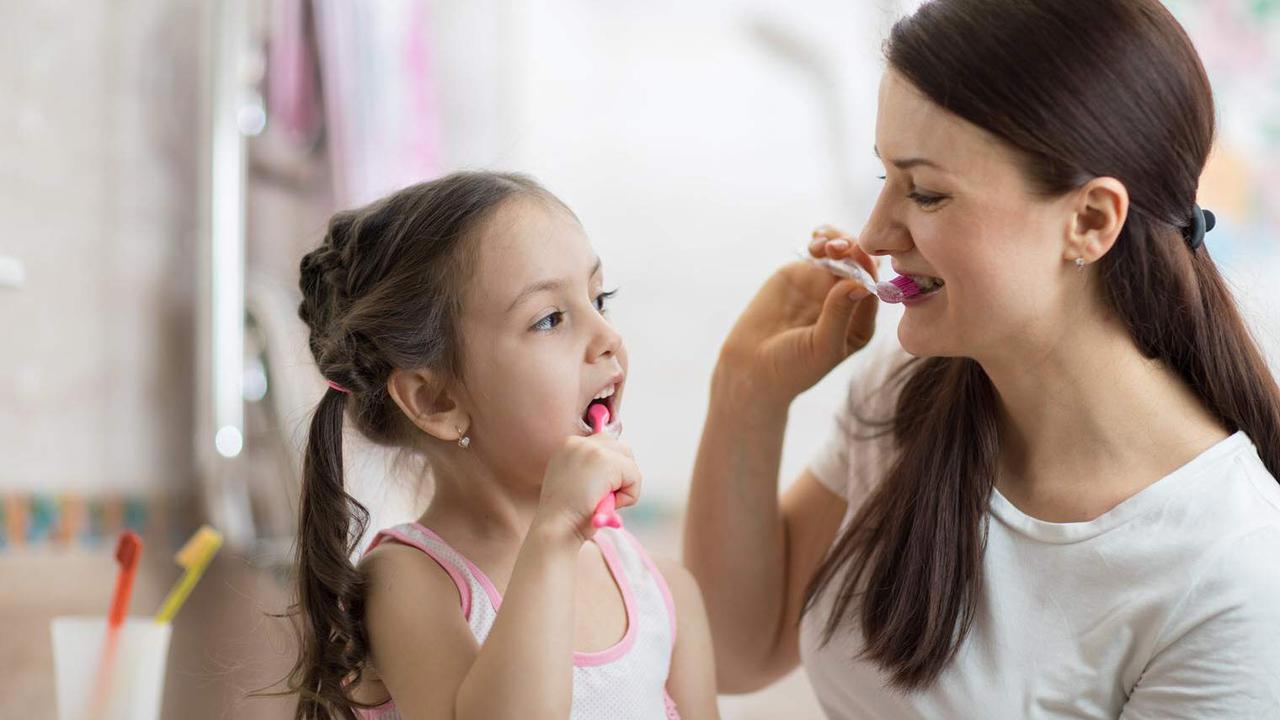
Oral hygiene for kids is so important in building good dental habits early on to maintain healthy teeth and gums and just general overall good hygiene. Oral health is also needed for overall well-being. Most children start developing baby teeth around six months and continue until three years old. Then adult teeth start to replace the baby teeth by around six years and onwards. Brushing teeth can commence as soon as your child develops a tooth. Good oral hygiene is achieved when the mouth and gums look and smell healthy. That is, teeth are clean, gums do not hurt or bleed when brushing or flossing and bad breath is not a problem.
Here are tips for teaching kids about oral hygiene:
- Ensure the basics of oral hygiene for kids.
- Incorporate brushing teeth into your kids routine.
- Regular dental check-ups.
1. Ensure the basics of oral hygiene for kids
Preventative oral care is important as good brushing and flossing will ensure that problems can be rectified before they become too serious. It is important to regularly visit the dentist and follow the below instructions at home to ensure good oral hygiene for kids.
- Start by assisting your child with flossing their teeth once a day, usually at night. Flossing can begin when their teeth start to touch each other.
- Then use a small amount of toothpaste on a child-size toothbrush and start by assisting your child to brush their teeth. Teeth need to be brushed in the morning and at night, for at least 2 minutes. Let your child hold the toothbrush to be part of it, but you will need to assist them until they are around six to eight years old. Toothbrushes need to be replaced approximately every three months.
- Ensure that proper brushing technique is followed - this includes tilting the brush at a 45 degree angle against the gums, brushing the outside, inside and chewing surfaces by using back and forth motions and gently brushing their tongue.
- Make sure your child spits out the toothpaste after brushing. There are specific toothpastes depending on children's ages, that have a low fluoride content when children may still find it difficult to not swallow the toothpaste.
- Have your child eat a balanced diet with less snacks between main meals, and limit sugary foods as these can cause cavities.
- Encourage your child to rinse their mouth with water after lunch and snacks.
- Regular dental checkups for children every six months to one year.
2. Incorporate brushing teeth into your kids routine
As brushing teeth needs to occur twice a day, it is best to incorporate it into your kids routine. For example, it could be that in the morning after breakfast the next step in getting ready is to brush their teeth. Before bedtime, it could be that after they are in their pyjamas that their teeth are brushed. It is best to have it a clear part of their routine, as then you will find in later years when they can brush their own teeth that you wont need to keep reminding them. It could also be that you brush your teeth as a family at the same time as your child's routine. Think about when it would work best for your kids and your family and set a clear routine.
Make oral hygiene for kids a fun part of their daily routine and a positive experience. Have a think about how to make it fun for your child and what they like to do - examples could be to make up a toothbrushing song or to put on a song that they like and that is an indicator for how long their teeth need to be brushed for.
3. Regular dental check-ups
Regular dental check-ups every six months to one year are an important part of preventative dental care to ensure that any issues, such as tooth decay, don't develop any further. Dental care for children is often free through the public dental system or for a no-gap or gap fee if you have private health insurance. Seeing a regular dentist can assist your child in getting to know the dentist, which can alleviate any fears about going to the dentist. You can also role play what will happen when your child goes to the dentist to get them used to it. There are also specific paediatric dentists that your children can go to as well.
Teaching kids about oral hygiene sets them up for good dental habits for life. We only get one set of adult teeth and it is so important that these are taken care of for healthy teeth, gums and overall well-being. A good child care centre may also teach oral hygeine basics, so find one that can help out at Toddle.com.au.